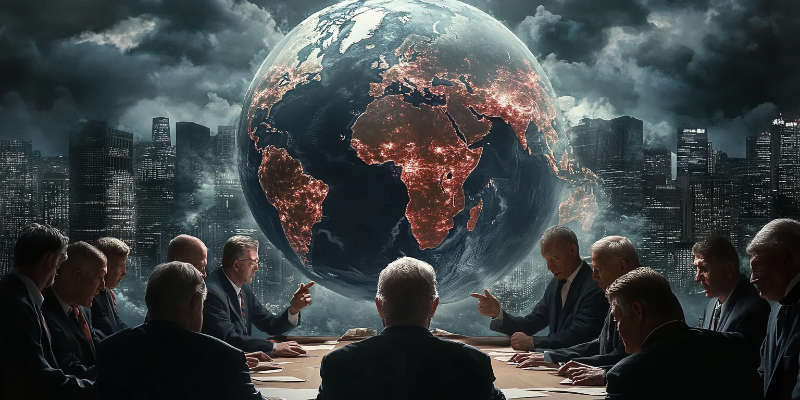The WEF and Globalist Organizations: Communism in Disguise?

For decades, globalist organizations such as the World Economic Forum (WEF), the United Nations (UN), and various non-governmental institutions have promoted policies that seek to reshape societies worldwide. While these organizations claim to advocate for sustainability, economic equity, and global cooperation, their ideological framework bears a striking resemblance to the principles of communism—at least as it has been practiced in history. From controlling land and food supply to mass surveillance and centralized economic control, their vision for the future aligns closely with authoritarian socialist regimes of the past.
Discouraging Private Land Ownership and Centralized Control
The Push Against Private Land Use
One of the hallmarks of communism is the abolition of private property in favor of state or collective ownership. Today, globalist organizations push policies that, in effect, discourage private land ownership through environmental regulations, zoning laws, and taxation strategies. Initiatives such as the UN’s Agenda 2030 emphasize dense urban development, often discouraging rural or independent land use in the name of sustainability (United Nations, 2023).
Government and Corporate Land Seizures
Large financial institutions and governments are increasingly acquiring vast amounts of farmland, reducing the ability of individuals to own and cultivate their land. Organizations like the WEF have promoted ideas such as “rewilding” land—essentially leaving vast swaths of land untouched, often placing it under government or corporate control (WEF, 2023). This mirrors historical communist policies where land was seized and collectivized, leaving individual farmers powerless.
Control Over the Food Supply
Pushing Synthetic and Lab-Grown Food
Communist regimes historically controlled the food supply, using it as a tool for compliance. Today, globalist organizations advocate for radical shifts in food consumption, pushing for lab-grown meat, insect consumption, and the reduction of traditional farming in the name of climate action (WEF, 2022). Meanwhile, large corporate entities are gaining increasing control over food production, diminishing self-sufficiency among local populations.
Regulating Small Farmers Out of Existence
New environmental laws and emissions restrictions are forcing small farmers out of business while multinational corporations dominate agriculture. This mirrors the Soviet and Maoist strategies of collectivized farming, which often led to food shortages and famine due to inefficient bureaucratic control (Lal, 2022).
“You Will Own Nothing and Be Happy”: The War on Private Ownership
The Promotion of Rent-Based Living
The WEF’s infamous slogan, “You will own nothing and be happy,” encapsulates their vision for a future in which private ownership is largely eliminated (WEF, 2016). Instead of owning homes, cars, or personal assets, individuals are encouraged to rely on subscription-based, rent-heavy lifestyles—controlled by corporations and regulatory bodies. This aligns closely with the communist model, where personal wealth was redistributed or outright banned, leaving individuals entirely dependent on the state.
Economic Control and Social Credit Systems
Many globalist proposals involve digital currencies controlled by central banks, where financial transactions can be monitored and restricted (IMF, 2023). Similar to China’s social credit system, these digital economies could be used to control behavior, denying access to services or funds for those who do not comply with government directives.
Mass Surveillance and Social Engineering
Tracking and Monitoring Populations
Just as totalitarian regimes of the past relied on mass surveillance and citizen informants to maintain control, globalist institutions advocate for widespread digital tracking. Vaccine passports, carbon tracking apps, and facial recognition technology are becoming increasingly common, all under the guise of public safety and climate accountability (UNESCO, 2023).
Censorship and Control Over Free Speech
Globalist entities are heavily involved in influencing online discourse. The European Union and the WEF have openly collaborated with social media platforms to regulate what they deem “misinformation” (European Commission, 2022). This resembles the censorship and propaganda tactics of past communist regimes, where only state-approved narratives were allowed.
Infiltrating and Influencing Governments
Placing Operatives in Key Political Positions
One of the most alarming aspects of globalist influence is their infiltration of national governments. WEF founder Klaus Schwab has openly boasted about his organization’s penetration of governments through its “Young Global Leaders” program, which has trained figures such as Emmanuel Macron, Justin Trudeau, and Jacinda Ardern (Schwab, 2020). These individuals often push policies aligned with WEF objectives, bypassing democratic accountability.
Supranational Governance and the Erosion of Sovereignty
Globalist organizations increasingly push for supranational governance structures, reducing the power of individual nations to make independent decisions. The European Union, the WHO pandemic treaty, and international climate agreements often impose policies without direct democratic input from the populations they affect (Sovereignty Coalition, 2023). This mirrors the central planning and top-down control inherent in communist governance models.
Conclusion: A Globalist Technocracy Resembling Communist Regimes
While globalist organizations claim to advocate for sustainability, economic fairness, and progress, their methods and goals bear a striking resemblance to the centralized control mechanisms of past communist states. From restricting private property to controlling food supplies, implementing mass surveillance, and infiltrating governments, these groups are steering the world toward a system where individual freedom is sacrificed for a collective agenda dictated by unelected elites. If history is any indication, such a system benefits the few at the expense of the many.
References
- European Commission. (2022). “Regulating Online Misinformation: A Collaborative Approach.”
- IMF. (2023). “Central Bank Digital Currencies: The Future of Monetary Policy?”
- Lal, D. (2022). “The Economics of Collectivized Farming: Lessons from the Past.”
- Schwab, K. (2020). “The Great Reset and the Role of Young Global Leaders.”
- Sovereignty Coalition. (2023). “The Push for Supranational Governance and Its Implications.”
- UNESCO. (2023). “Facial Recognition, Digital IDs, and the Future of Privacy.”
- United Nations. (2023). “Agenda 2030 and the Future of Land Use.”
- WEF. (2016). “Welcome to 2030: You Will Own Nothing and Be Happy.”
- WEF. (2022). “Sustainable Diets: The Role of Lab-Grown Meat and Insect Protein.”
- WEF. (2023). “Rewilding and the Future of Land Conservation.”


















